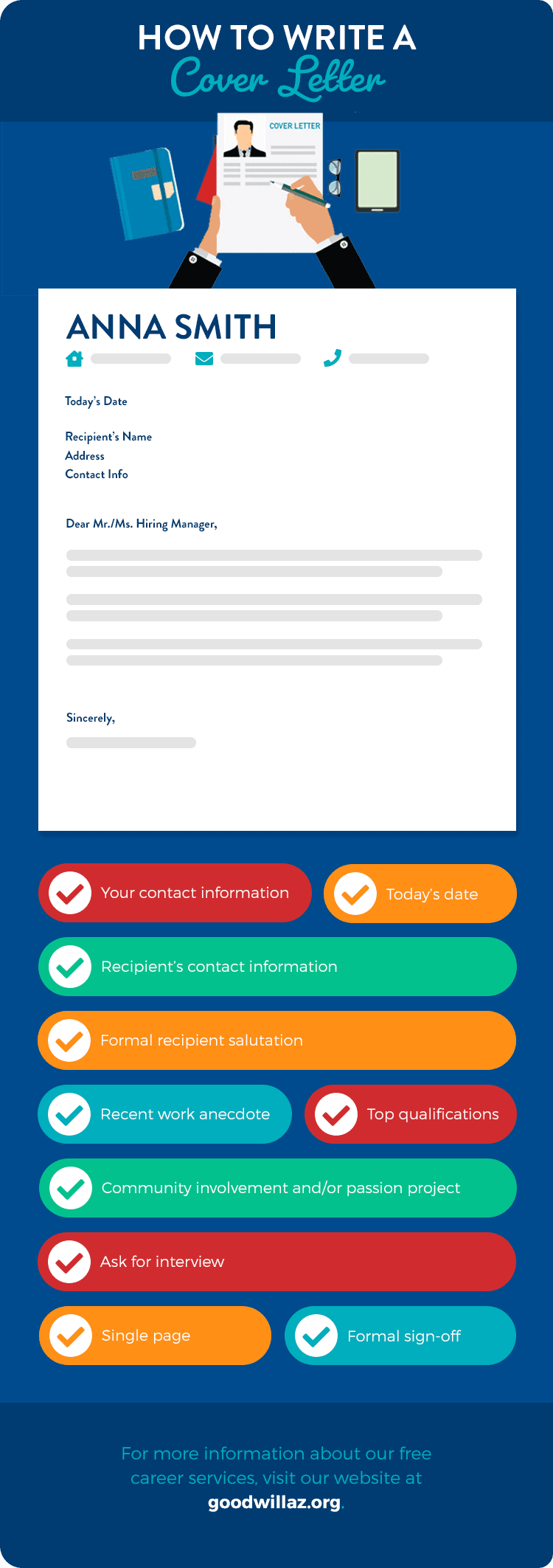

January 20, 2022
For most people who are seeking jobs hiring near them, the resume is the first thing they complete. While getting your resume ready is important, a polished and engaging cover letter is equally important but can often leave people at a loss for what to write. Rather than waiting until you’re ready to apply for a specific job, creating a cover letter template ahead of time, as you would a resume, will save you time and stress once you find the open position you want.
The formatting and content of your cover letter will be a deciding factor in whether a potential employer wants to bring you in for an interview. A cover letter is the first impression you will make on a new employer. At Goodwill of Central and Northern Arizona, we recommend that you use the below tips to guide you through the cover letter writing process.

Just as you would put your name and contact information at the top of your resume, you should also do so on your cover letter. In fact, many people like to use the same formatting on both pieces. If you choose to have some sort of design or branding feature on your resume, you can mimic that formatting on your cover letter.
Include your name and contact information, along with your phone number and email address. It is customary to also include your physical address, however, it isn’t necessary since most people communicate electronically and there’s more flexibility with remote work. Below your contact information, include the date with the month written out.
If you’ve ever written a professional business letter, a cover letter is similar. You’ll want to include your potential employer’s name and contact information just below the date with a space in between. This is when it’s helpful to know the name of the person you’re addressing. However, you won’t always know who to address it to. If you don’t have a specific name, you may use the name of the company with the physical address.
After the recipient’s contact information, then comes the proper salutation. “Dear [recipient name]” is customary, followed by a comma or colon. If you don’t have a specific name, you can use “To Whom It May Concern” or “Dear Hiring Manager” though it’s preferable to use a name.
Following your and your recipient’s contact information and salutation will be the introduction paragraph. In the first paragraph of your cover letter, you will include a brief introduction of yourself and the purpose of your letter. You can keep it generic if you choose to, but this is also a great opportunity to show off your personality a little.
The main content of your cover letter is your chance to engage with your potential new employer and showcase what makes you unique and qualified for the job. Try to keep it concise as you introduce yourself in the introduction of your cover letter.
Your cover letter will accompany your resume, which will showcase a complete list of your qualifications and skills that make you a good fit for the job. In the cover letter, it is a best practice to summarize your top qualifications and strengths, while elaborating more than you could in the bulleted format of your resume. While you will use an active voice in your resume, resulting in short and concise statements, you should take a slightly softer approach to the tone of your cover letter.
When you write in a natural tone as if you’re talking in an interview, the recipient gets to know your personality through the words you choose. Highlight no more than two or three qualifications in your cover letter. If you have a lot of work history, you can focus on one or two recent examples or experiences that best illustrate your highest qualifications. Using specific examples adds color and interest to your letter while demonstrating how you’ve used relevant skills in a professional setting.
One easy way to highlight how your work skills make you qualified is to tell a story about how you used these skills in a real work scenario. Perhaps you were faced with a challenge that you overcame or you implemented a new process that led to an increase in sales. Telling a work anecdote will help you bring your work qualifications to life.
If you are involved in your community or have a unique passion project, don’t be afraid to talk about it in your cover letter. Community roles are a great way to demonstrate your character and passion projects tell the recipient a little bit about your time outside of work.
Finish your letter with a simple one- or two-sentence concluding paragraph. Reiterate your interest in the job, asking to take the next step to come in for an interview, and thanking the recipient for their time. A formal sign-off is customary, even if you think the job application is casual. Include “Sincerely, [your full name]” at the end of the letter.
It’s customary to keep your resume and cover letter to one page each. Your cover letter should be about four or five succinct paragraphs long. When you look at your cover letter printed out, there should be some white space at the top and bottom. Visually, having some white space helps the letter feel more approachable and readable, rather than if you had many chunky paragraphs filling the whole page.
Keeping your cover letter to one page is also in your benefit. The hiring manager will only have time to quickly read or perhaps even skim every applicant’s letter and resume. By crafting your letter with your best features, the recruiter can quickly get to know who you are and if you’re qualified. Plus, adding in a little personality will allow you to stand out from the rest. If you sound too robotic, you run the risk of getting passed over for the job.
To learn more about the best tips and tricks for finding and landing great jobs hiring near you, contact Goodwill of Central and Northern Arizona today.